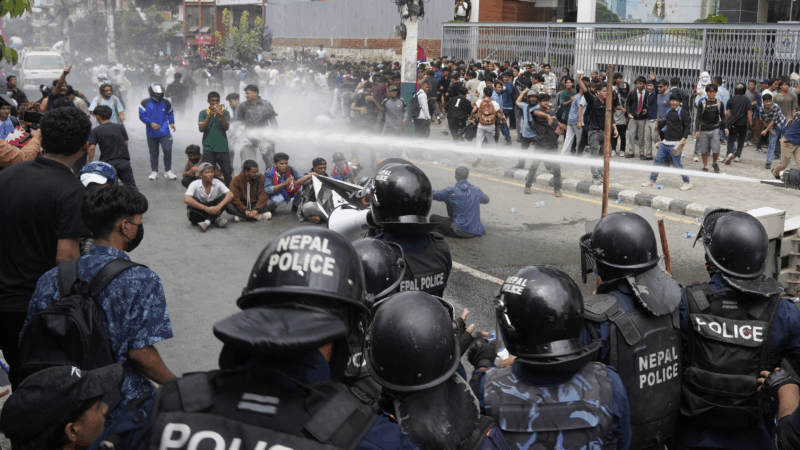Nepal lifts social media ban following protests where police killed 19 people
KATHMANDU, Nepal — Nepal’s government lifted its ban on social media platforms Tuesday a day after police killed opened fire on mass street protests against the ban, killing 19 people.
The district administration ordered an indefinite curfew in the capital and schools were closed. A curfew was also imposed in two other cities.
Several widely used social networks, including Facebook, X and YouTube were blocked in the Himalayan nation last week after failing to comply with a new requirement to register and submit to government oversight.
Rallies against the ban swelled to tens of thousands of people in Kathmandu and crowds surrounded the Parliament building before police opened fire on the demonstrators.
“Stop the ban on social media. Stop corruption, not social media,” the crowds chanted, waving national flags. Monday’s rally was called the protest of Gen Z, which generally refers to people born between 1995 and 2010.
Seven of those killed and scores of the wounded were received at the National Trauma Center, the country’s main hospital.
“Many of them are in serious condition and appear to have been shot in the head and chest,” said Dr. Badri Risa. Families waited for news of their relatives while people lined up to donate blood.
Prime Minister Khadga Prasad Oli said in a statement he was forming an investigating committee to submit a report in 15 days and that compensation would be given for the lives lost and free treatment for the wounded.
Home Minister Ramesh Lekhak also resigned at an emergency Cabinet meeting late Monday.
The violence unfolded as Nepal’s government pursues a broader attempt to regulate social media with a bill aimed at ensuring the platforms are “properly managed, responsible and accountable.” The proposal has been widely criticized as a tool for censorship and for punishing government opponents who voice their protests online.
The registration requirement applied to about two dozen social networks widely used in Nepal.
Neither Google, which owns YouTube, nor Meta, the parent company of Facebook, Instagram and WhatsApp, responded to requests for comment from The Associated Press. Elon Musk’s X platform did not respond either.
The video-sharing app TikTok, Viber and three other platforms have registered and operated without interruption.
The bill includes asking the companies to appoint a liaison office or a point of contact in the country. Rights groups have called it an attempt by the government to curb freedom of expression and fundamental rights.
Nepal in 2023 banned TikTok for disrupting “social harmony, goodwill and diffusing indecent materials.” The ban was lifted last year after TikTok’s executives pledged to comply with local laws, including a ban of pornographic sites that was passed in 2018.
Deadline looms as Anthropic rejects Pentagon demands it remove AI safeguards
The Defense Department has been feuding with Anthropic over military uses of its artificial intelligence tools. At stake are hundreds of millions of dollars in contracts and access to some of the most advanced AI on the planet.
Pakistan’s defense minister says that there is now ‘open war’ with Afghanistan after latest strikes
Pakistan's defense minister said that his country ran out of "patience" and considers that there is now an "open war" with Afghanistan, after both countries launched strikes following an Afghan cross-border attack.
Hillary Clinton calls House Oversight questioning ‘repetitive’ in 6 hour deposition
In more than seven hours behind closed doors, former Secretary of State Hillary Clinton answered questions from the House Oversight Committee as it investigates Jeffrey Epstein.
Chicagoans pay respects to Jesse Jackson as cross-country memorial services begin
Memorial services for the Rev. Jesse Jackson Sr. to honor his long civil rights legacy begin in Chicago. Events will also take place in Washington, D.C., and South Carolina, where he was born and began his activism.
In reversal, Warner Bros. jilts Netflix for Paramount
Warner Bros. says Paramount's sweetened bid to buy the whole company is "superior" to an $83 billion deal it struck with Netflix for just its streaming services, studios, and intellectual property.
Trump’s ballroom project can continue for now, court says
A US District Judge denied a preservation group's effort to put a pause on construction







